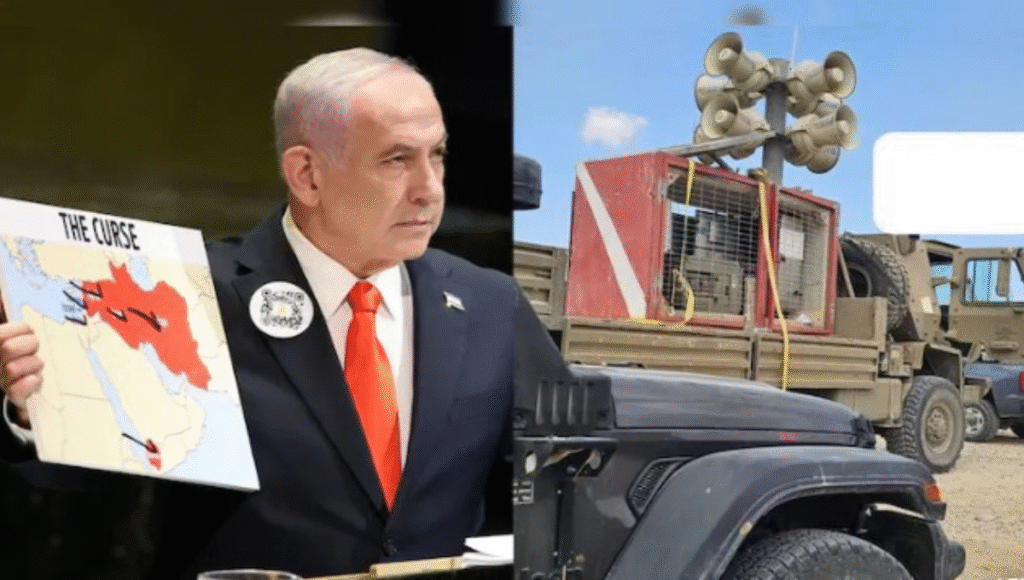
Israeli Army Netanyahu UN Speech Echoes Across Gaza
On Friday, the world watched as Israeli Prime Minister Benjamin Netanyahu delivered one of his most defiant addresses at the United Nations General Assembly. But while his words echoed through the halls of the UN, they also reached the ears of Gazans in a way no one could have imagined. The Israeli government carried out what it called an “unprecedented operation,” ensuring that Netanyahu’s speech was heard not only through global media but also directly inside Gaza itself.
To achieve this, the Israeli military set up loudspeakers along the Israel-Gaza border, amplifying the Prime Minister’s words across the divide. Even more striking was the claim that Israeli forces took control of phones inside Gaza, overriding them to broadcast Netanyahu’s address live. For many, this was more than a speech—it was a calculated demonstration of power and narrative control at a time when the war with Hamas remains relentless.
Netanyahu’s tone was unyielding. “Israel must finish the job against Hamas,” he declared, rejecting calls to end the conflict. His words came against the backdrop of mounting international pressure, with many nations urging restraint and peace talks. But Netanyahu was clear: Israel would not bend, even as critics accuse him and his government of committing war crimes during the Gaza campaign.
The scene at the UN was equally dramatic. Dozens of delegates walked out in protest as Netanyahu began to speak, leaving rows of empty seats in silent opposition. Inside the chamber, shouts of disapproval interrupted the speech, reflecting just how divided global opinion has become. Despite the resistance, Netanyahu pressed on, determined to project strength on the world’s largest diplomatic stage.
Symbolism ran deep during the address. The Prime Minister wore a hostages pin bearing a QR code linked to October 7, the day of Hamas’s attacks, which Israel continues to cite as the justification for its military campaign. He held up a map titled “THE CURSE,” framing his message as both a history lesson and a warning about the dangers of what he calls global complacency toward antisemitism. “Anti-semitism dies hard. In fact, it doesn’t die at all,” Netanyahu said, drawing a direct line between ancient prejudice and present-day hostility toward Israel.
The larger political context cannot be ignored. While over 150 countries now recognize Palestine as a state, the United States remains a notable holdout. Former President Donald Trump, speaking just a day before Netanyahu’s address, said he would not allow Israel to annex the occupied West Bank. Yet, Netanyahu’s government has pushed controversial settlement projects that could effectively split the West Bank in half, casting doubt on any future prospects for a Palestinian state. These moves only deepen the rift between Israel and much of the international community, further isolating Netanyahu even as he finds staunch allies in Washington.
The broadcast into Gaza highlighted the extremes to which Israel is willing to go to assert control—not only militarily but also through information and communication. For Gaza residents, the intrusion into their phones and the blaring of Netanyahu’s voice across loudspeakers was a stark reminder of how the conflict invades every aspect of life. What was framed as a “historic speech” by Israel’s government was, to many Palestinians, yet another act of dominance in a war where their voices often feel silenced.
Yet, for Netanyahu, the speech was about shaping global perception and rallying domestic support. “I will tell our truth,” he said, denouncing leaders who recognize Palestinian statehood as siding with “murderers, rapists, and burners of children.” His words were sharp, designed to provoke and to push back against growing criticism abroad.
The reaction to his address will undoubtedly ripple in the weeks to come. With Trump and Netanyahu expected to meet, questions loom about how U.S. policy might shift in response to ongoing Israeli settlement expansion and the continued blockade of Gaza. Meanwhile, the people of Gaza remain trapped between rhetoric and reality, with their daily lives shaped by policies made far from their homes.
Netanyahu’s speech may have been just one moment in the ongoing saga of the Israel-Palestine conflict, but the way it was delivered—echoing across Gaza through both loudspeakers and mobile phones—ensured it would not go unnoticed. It was not only a message to the world but a direct reminder to Palestinians of the power imbalance that defines their existence.
As the conflict grinds on, one thing is clear: words, like weapons, have become part of the battlefield. And in this war of narratives, Netanyahu is determined that his voice will be heard, no matter the cost.
Disclaimer: This article is written for informational purposes only, based on publicly available reports. It does not endorse or oppose any political position. Readers are encouraged to consult multiple sources to form a balanced understanding of the ongoing Israel-Palestine conflict.





